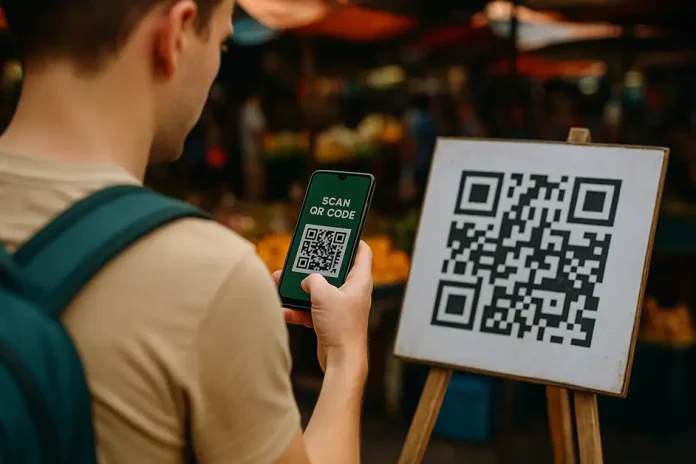Already read our first guide on common tourist scams in Asia?
That one covered the classic street traps — taxi overcharging, fake monks, and gem shop cons.
But scams are evolving fast. In 2025, the new danger isn’t just on the streets — it’s on your phone screen, QR code, and Wi-Fi network.
This Part 2 dives into the latest digital and high-tech scams now targeting tourists across Asia. Let’s uncover what’s trending among scammers and how you can stay safe before your next trip.
⚠️ 1. Fake QR Code Payment Scams (China, Vietnam, Thailand)
QR codes are everywhere in Asia — from temple donations to street food stalls.
Scammers are now placing fake QR stickers over real ones. You scan, pay, and the money goes straight into a thief’s account.
How to avoid it:
- Always ask the vendor to confirm their name after you scan.
- Use verified e-wallets with built-in scam alerts (e.g., Alipay, GrabPay).
- Avoid paying large sums by QR if it’s your first time at that stall.
🧠 2. AI Voice & Deepfake Hotel Calls (Japan, Korea, Singapore)
Some travelers report receiving “urgent calls” from their hotel reception — a friendly voice says there’s a problem with your booking or card. The voice sounds real, even uses your name, but it’s an AI-generated scam.
How to avoid it:
- Hang up and call the hotel directly via the front desk or official app.
- Never share your card details or passport info over the phone.
📶 3. Phishing Wi-Fi Hotspots at Airports and Cafés
Scammers create Wi-Fi networks that look almost identical to the real ones: “Starbucks_Free_WiFi” or “Airport_Free_WiFi2”. Once connected, they can track your logins, passwords, or credit card use.
How to avoid it:
- Always ask staff for the correct network name.
- Use a VPN when connecting to public Wi-Fi.
- Avoid logging into banking or booking apps in public Wi-Fi areas.
💳 4. Counterfeit eSIM and Data Plan Scams
With eSIMs becoming popular, fake travel data websites and kiosks are now selling non-working or cloned eSIMs that steal your phone number or personal info.
How to avoid it:
- Buy eSIMs only from verified providers (Airalo, Nomad, etc.).
- Avoid random links in Telegram, WhatsApp, or travel groups.
🧾 5. Fake Travel Agency & Ticket Reseller Websites
That “super cheap Japan Rail Pass” or “50% off Universal Studios ticket” deal might look tempting — until your QR ticket is rejected at the gate.
Many scam sites now use AI-written reviews and fake logos to appear legitimate.
How to avoid it:
- Always cross-check the URL with the official website.
- Use only authorized resellers listed on the attraction’s own page.
💰 6. Crypto & Donation QR Traps (Malaysia, Hong Kong, Taiwan)
Scammers dressed as “charity workers” or “temple volunteers” may ask tourists to scan a QR for donations or NFT gifts.
You think you’re donating $5, but your crypto wallet might send $500 due to a hidden script.
How to avoid it:
- Never scan a QR from strangers, even if it looks like a donation drive.
- Use cash for small street donations instead.
📱 7. Fake E-Wallet Refunds and “Super App” Offers
Fraudsters now pose as customer service agents offering “refunds” for food delivery or taxi apps. They’ll send a link that mimics the official platform, asking for login or payment info.
How to avoid it:
- Contact the app’s support through official in-app chat only.
- Never click refund links sent via SMS or WhatsApp.
🌏 The New Era of Scams
In many parts of Asia, digital convenience moves faster than regulation — which gives scammers an edge.
They mix old street tricks with new technology, making it harder for even experienced travelers to spot.
Before your next adventure, read both parts of our guide:
👉 Part 1 – Classic Tourist Scams in Asia
👉 Part 2 – (You’re reading it now!) Digital & AI Scams
Stay alert, trust your instincts, and double-check everything — especially anything that involves scanning or clicking.
🧭 Frequently Asked Questions (FAQ)
Q1: Are QR code scams really that common in Asia?
Yes. With mobile payments being widespread in countries like China and Thailand, fake QR stickers are becoming one of the fastest-growing scams.
Q2: Is public Wi-Fi safe to use while traveling?
Only if you confirm the official network name and use a VPN. Avoid logging into sensitive apps like banking or PayPal on open Wi-Fi.
Q3: How can I check if a travel agency website is legit?
Look for HTTPS in the URL, cross-check with the attraction’s official reseller list, and search the company name + “review” before paying.
Q4: What should I do if I get scammed abroad?
Report the case to local police and your embassy immediately. Also contact your bank to freeze your card or dispute payments.
Q5: Where can I learn more about staying safe while traveling in Asia?
Check our full list of travel tips and bookmark both Part 1 and Part 2 of our Common Tourist Scams in Asia series for ongoing updates.




